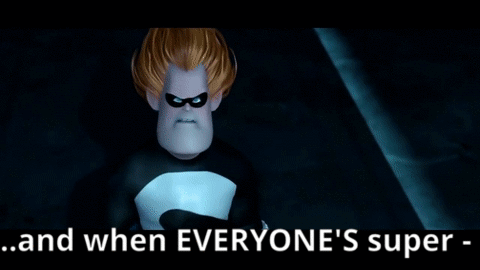In making photography accessible to all, photography inadvertently killed itself
posted Tuesday, March 7, 2017 at 9:00 AM EDT

I know that as I write this, that this is a touchy subject already. I also know that to refer to all the moving parts that make up this industry as one blanket "photography" is hardly fair, but there is a point to be made, so bear with me. There are very good arguments on both sides of the aisle that will vehemently make solid arguments on this matter of "consumerizing" photography. On one hand, making photography easily accessible at first put a lot of money into the research and development of equipment, giving us some truly mindblowing camera technology. More access means more people with cameras, which means more talent is discovered. There was a golden age for digital photography not too long ago, right before the cell phone camera became serviceable, where we saw some incredible advancements in equipment, and a swell of interest from the world at large. Convention centers were full, photography schools were booming, and the industry had money.
But on the other hand, commoditizing photography had what is now, in retrospect, a rather obvious side effect: if everyone is a photographer, no one is.

That's a bit dramatic perhaps, but looking at the industry and culture of photography in 2017, it's somewhat chilling how accurate that idea is turning out to be.
Popular Photography/American Photo is shutting down, their next issue to be their last. Bonnier, their parent company, isn't even preserving their online presence and choosing to just end the business they acquired in 2009. This, the latest in a string of closures and series of bad news that should have you worried. Let's recap the last few years:
Schools are Closing
Last August, the incredibly well-respected Brooks Institute closed its doors, and a week later the Hallmark Institute announced they too would be closing their doors.
Why go to school to learn photography? Today, there are more reasons to not go to school to be a photographer than there are reasons to do so. The problems plaguing new graduates from any University are even more pronounced to the photo industry, a place where there are arguably very few well-paying jobs. Where there used to be many well-compensated editorial roles, you now have the Chicago Sun Times. There simply is no room in an already crowded workforce that is only getting smaller by the day.
Creative Roles are Downplayed
I read an article that really summarized best what it's like to be even on the top-end of the photography industry. In it, fashion photographer Kristiina Wilson says two things that really got me. The first:
"I don’t know anyone in this industry who isn’t currently owed thousands of dollars. I’m owed well into the $27,000 range in truant payments."
I am not even kidding, that was me last August. As a working photographer, that struck a chord with me, as I was going through the exact situation. The second thing she said is even more indicative of the attitude towards creative professionals:
"Oftentimes, I’m paying to create the work for the client. They’ll give me $200 for [production], when I need at least $1,000. And if you don’t go along with that system, or you complain about it, people think you’re a loser or that you’re not doing well enough. You’re supposed to be doing well enough that you’ll work for free."
That last bit, as contradictory as it logically should be, absolutely holds true. The idea of the photographer is hurting the reality of them.
Camera Companies are Struggling
Just look at the how the major camera brands (Canon, Nikon and Sony) are doing. It's not good. It hasn't been good for years. Sony was the only one to buck the trend there for a bit, but they too are experiencing a downward trend in sales, their sensor business doing most of the heavy lifting. Nikon, shockingly and for the first time anyone can remember, announced no new products at CP+ this year. That was unthinkable not a year ago. Hell, it's pretty unthinkable to me right now.
But it happened.
Long-Standing Accessory Brands are Failing
Seven years ago I worked for Photoflex, a lighting manufacturer based out of Santa Cruz, California. Photoflex made some of the best softboxes around, and for years was revered as some of the highest quality equipment you could obtain outside of Broncolor and Profoto. They closed their doors two years ago, with all their local staff being laid off and their brand acquired by a European company (none of the original employees remain, and the company mostly just uses what little clout the Photoflex brand still carries). Back in 2012, I wrote an article that explained that 1) this was pretty much inevitable now and 2) would have far-reaching effects on the industry. That is to say, the way we see labor and the way products are produced was changing, and that would have a big effect on the brands we know and love (and the money that came with them):
"There is no way out of this cycle of depression for most United States companies. They can’t afford to move engineering back to the states because their budgets don’t allow for it. They can’t raise prices on their current product because they won’t be able to compete against the Chinese product. They can’t innovate new products because the engineers are all in China. Even if they do come up with something new, the costs are prohibitive, and the Chinese aren’t dumb. They will charge a lot to prep it for mass production. Even if things get that far, it will be a matter of weeks before a knockoff product is available for less from China. I have personally even witnessed patent infringements by China with products sold in the United States, but lawsuits are expensive and many companies simply can’t afford the cost to protect their own property anymore."
What has happened? PocketWizard has fallen from grace (when was the last time you got really excited about their product?). Yonguo now easily undercuts and outsells Canon and Nikon on speedlights. DJI has emerged as a huge leader in electronics and innovation. Let it be known that I don't have anything against these companies, but only that the market is trending towards cheaper, where American companies cannot compete. Just look at how the GoPro Karma did when compared with the DJI Mavic at launch. It wasn't even close. Granted, GoPro has made some changes and it appears to be fixed, but the giant launch snafu most certainly hurt that drone's credibility.
It All Culminates
In their desire to make photography more accessible to all, those who worked so hard to do so only hastened a depression in the industry that we are all seeing now. With everyone thinking that they are only a weekend class and a "nice" camera away from being a professional (and honestly, thanks to the iPhone even that "nice" camera bit could be removed), the value on the photographer has fallen. When the photographer no longer has value, they can no longer support the upper echelon of photography gear, which leads to less 1DX and D5 units being sold. When there are fewer professional photographers, there are fewer people interested in pursuing the career. When there are fewer people pursuing the career, fewer cameras are made, school attendance drops, and there is less interest in the craft.
When there is less interest in the craft, the consumer cares less about buying a new camera. Their cell phone is all they need. And when the consumer stops buying cameras, now the camera companies have lost both the top and bottom sales tiers.
And we have a depression.
I'm probably shouting into the void at this point, because anyone reading this article is going to be the one to praise creatives and demand that we be treated as the skilled laborers that we are. I am not expecting to elicit change in this echo chamber. What I am saying is... we all helped create this problem. We all asked for cheap. Do not deny it. If you wanted a speedlight, you bought a Yongnuo one instead of that Canon one. Or you purchased a cheaper brandless memory card instead of one from Lexar or Sandisk. Or you bought a cheap octobox instead of one from Profoto. You refused to subscribe to a magazine because you wanted your news for free.
You demanded cheap, and that's what you got. Except it wasn't just the purchase you made, it ended up being the way the whole world looked at what you do.